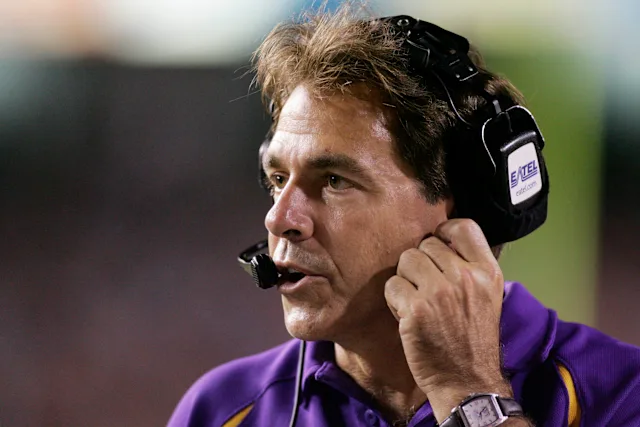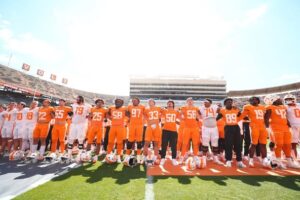
A Legacy Forged in Purple and Gold: Tracing the Sideline Commanders of LSU Football (1955-Present)
LSU of leaders on the LSU football sideline. The head coaching position at Louisiana State University is not merely a job; it’s a stewardship of a fervent fanbase’s passion, a custodian of a proud tradition, and a crucible where legends are forged. Beginning in 1955, a pivotal year that saw the arrival of Paul Dietzel, the program embarked on a journey marked by national championships, iconic figures, and the unwavering pursuit of gridiron glory.
Dietzel’s tenure, spanning from 1955 to 1961, laid a foundational stone for modern LSU football. While his early years presented challenges, Dietzel masterminded the improbable 1958 national championship season. Led by the “Chinese Bandits” defense and the powerful running of Billy Cannon, the Tigers captured their first national title, etching Dietzel’s name into LSU lore. Beyond the championship, Dietzel instilled a culture of toughness and resilience that resonated throughout the program. His departure left a void, but the seeds of success had been sown.
Succeeding Dietzel was Charlie McClendon, a Louisiana native who would become synonymous with LSU football for nearly two decades (1962-1979). “Cholly Mac” navigated the turbulent landscape of the 1960s and 70s, consistently fielding competitive teams in the rugged Southeastern Conference. While a national championship eluded him, McClendon’s Tigers were a perennial force, claiming two SEC titles (1970 and 1972) and producing a steady stream of All-Americans. His longevity and deep connection to the state cemented his status as a beloved figure, his gruff exterior masking a genuine care for his players and the program’s well-being. The stadium’s south end zone at one point bore his name, a testament to his enduring impact.
The 1980s ushered in a period of relative instability on the LSU sideline. Jerry Stovall, a former LSU All-American under McClendon, took the reins from 1980 to 1983. Despite his deep ties to the program, Stovall struggled to replicate the success of his predecessor, and his tenure concluded after four seasons. Bill Arnsparger, a highly respected defensive mind who had previously served as defensive coordinator under Bear Bryant at Alabama and Don Shula with the Miami Dolphins, followed Stovall, coaching the Tigers from 1984 to 1986. Arnsparger brought a renewed emphasis on defensive prowess, but ultimately his teams fell short of championship contention.
The arrival of Mike Archer in 1987 marked a significant turning point. At just 34 years old, Archer became one of the youngest head coaches in Division I football. A fiery and passionate leader, Archer initially ignited the program, leading the Tigers to an SEC Championship in 1988. However, the momentum proved difficult to sustain, and inconsistencies led to his departure after the 1990 season. While his tenure was ultimately brief, Archer injected an energy and swagger back into the program that resonated with a new generation of fans. Notably, Mike Archer served as the defensive coordinator for the Tigers from 1984 to 1986, prior to becoming head coach.
The 1990s witnessed a period of rebuilding under Curley Hallman (1991-1994). Hallman inherited a program seeking stability and worked to lay a foundation for future success. While his teams showed flashes of potential, they ultimately struggled to consistently compete at the highest level in the SEC. His tenure ended after four seasons, paving the way for a coach who would usher in a new era of LSU football.
In 1995, Nick Saban arrived in Baton Rouge, signaling a seismic shift in the program’s trajectory. Known for his meticulous preparation, demanding coaching style, and unwavering commitment to excellence, Saban transformed LSU into a national powerhouse. Over five seasons (1995-1999), he instilled a culture of discipline and accountability that had been absent for too long. He revitalized recruiting, attracted top-tier talent, and laid the groundwork for the program’s resurgence. While a national championship eluded him during his first stint in the SEC, Saban’s impact was undeniable, setting the stage for the ultimate prize.
Following Saban’s departure for the NFL, Bob Stoops was widely expected to take the LSU job. However, Stoops opted for the head coaching position at Oklahoma, and the Tigers turned to Nick Saban’s offensive coordinator, Jimbo Fisher, as interim head coach for the 2000 Independence Bowl. This brief period served as a transition, leading to the arrival of another pivotal figure in LSU history.
In 2000, Nick Saban returned to the college ranks, accepting the head coaching position at LSU. His second tenure (2000-2004) cemented his legacy in Baton Rouge. Building upon the foundation he had laid, Saban guided the Tigers to their second national championship in 2003, a dominant season that culminated in a Sugar Bowl victory over Oklahoma. His relentless pursuit of perfection and ability to develop players at an elite level established LSU as a consistent national contender.
Following the 2004 season, Nick Saban departed once again, this time for the Miami Dolphins. The LSU faithful, while disappointed, understood the magnitude of his accomplishments and the championship pedigree he had instilled. The program was no longer content with merely competing; it expected to win at the highest level.
Les Miles, known for his colorful personality, unconventional coaching decisions, and knack for winning close games, took over the LSU program in 2005. “The Mad Hatter” continued the success built by Saban, leading the Tigers to their third national championship in 2007 with a resounding victory over Ohio State. Miles’ teams were characterized by their physicality, strong running game, and opportunistic defense. He navigated the challenges of the SEC with a unique blend of charisma and grit, consistently fielding competitive teams and capturing two SEC West titles and another SEC Championship in 2011. However, after a decade at the helm, inconsistencies and declining offensive production led to his dismissal during the 2016 season.
Ed Orgeron, a Louisiana native with deep recruiting ties to the state, served as the interim head coach for the remainder of the 2016 season and was subsequently named the permanent head coach. “Coach O” brought an infectious energy and passion to the program, resonating with both players and fans. He assembled a talented coaching staff and, in 2019, orchestrated one of the most dominant seasons in college football history. Led by Heisman Trophy-winning quarterback Joe Burrow and a high-powered offense, the Tigers steamrolled through the competition, culminating in a decisive national championship victory. However, the program struggled to maintain that level of success in the subsequent seasons, and Orgeron and LSU mutually agreed to part ways following the 2021 campaign.
The latest chapter in LSU football’s head coaching history began with the arrival of Brian Kelly in 2022. Kelly, one of the most successful active coaches in college football, brought a wealth of experience and a proven track record of winning. His tenure at LSU has been marked by a commitment to modernizing the offense and building a sustainable program capable of competing for national championships. After a successful first season that included an SEC West title, the program under Kelly aims to continue its pursuit of excellence and add to the rich tapestry woven by its previous sideline leaders.
From the foundational years under Dietzel to the modern era under Kelly, the LSU football head coaching lineage is a testament to the program’s enduring commitment to success. Each coach has left their unique mark, navigating different eras and challenges while striving to uphold the high standards set by their predecessors. The echoes of “Hold That Tiger” continue to resonate in Death Valley, a constant reminder of the legacy forged by the men who have commanded the sidelines in purple and gold. The story is still being written, with each season adding another layer to the captivating history of LSU football.





